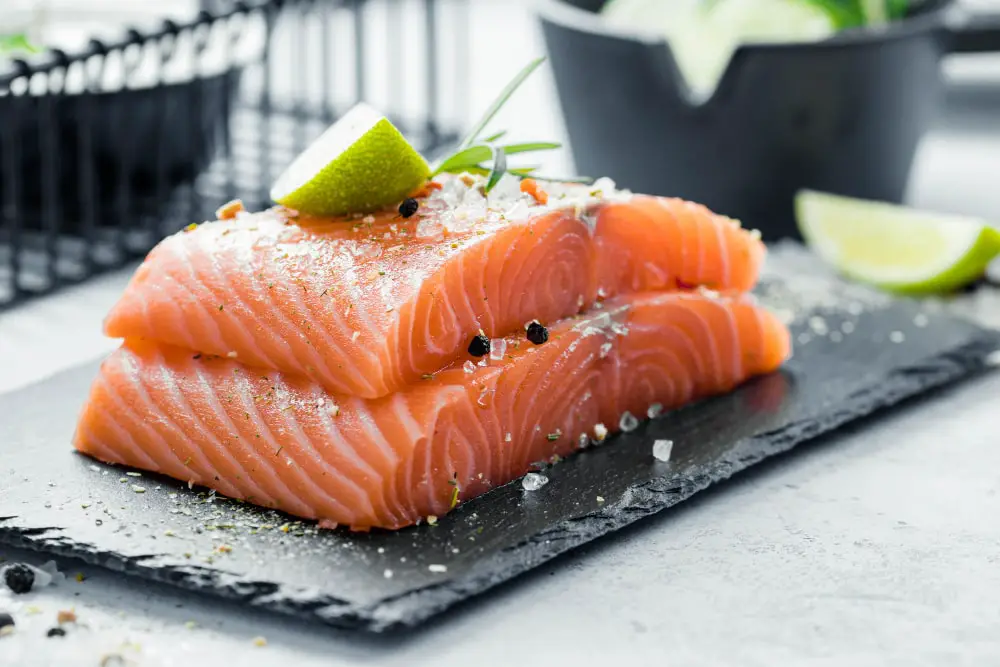This post contains affiliate links. When you buy through our links, we may earn a commission.
Do you like to eat salmon and want to know how much protein is in 6 oz. of salmon? If yes, then rest assured to get your desired answer.
Salmon is a superfood because it has all essential nutrients like proteins and vitamins. Salmon are known for their high protein content and omega-3 fatty acids. There are six species of salmon, five of them live in the Pacific Ocean, and only one of them lives in the Atlantic Ocean.
Each type of salmon has a slightly different value of protein content than the other. On average, 6 oz of salmon has 34 grams of protein in it.
Let’s get to know more about the salmon meat!
- Is Salmon A Good Source Of Protein?
- How Much Protein In 6 Oz Of Salmon?
- Is It Ok To Eat Salmon Every Day?
- How Much Is Too Much Salmon?
- Why Is Salmon Bad For You?
- Who Should Not Eat Salmon?
- Is Salmon Good For The Heart?
- Is Fried Salmon Good For You?
- Is Canned Salmon As Healthy As Fresh?
- Is Chicken Or Salmon Healthier?
- What Happens If You Eat Too Much Salmon?
- Conclusion
Is Salmon A Good Source Of Protein?
Yes, salmon is a good source of protein. Also, salmon is one of the most protein-rich food. It is well-known and praised for its high protein content and less saturated fats. Now salmon is farmed on a large scale, and there is a slight difference in the nutrition value of wild-caught and farmed salmon.
Wild salmon has a higher level of environmental contaminants, while farmed salmon has a lower level of environmental pollutants. Different salmon species had different protein content. Following is the protein content in 100 grams of meat of different salmon species:
| Salmon Species | Protein in 100 g Salmon |
|---|---|
| Atlantic Salmon | 20 grams |
| Chinook Salmon | 26 grams |
| Chum Salmon | 20 grams |
| Coho Salmon | 24 grams |
| Sockeye Salmon | 25 grams |
| Pink Salmon | 25 grams |
How Much Protein In 6 Oz Of Salmon?
Salmon are known for their high-quality proteins. The protein content of different types of salmon is different from each other. The protein content of farmed and wild-caught salmon also differs.

On average, 100 grams of raw salmon meat contains 20% protein, but the density of protein increases in cooked salmon as fluids escape, and only protein and other nutrients remain in salmon meat.
The following table shows how much protein 6 oz of different species of salmon contain.
| Salmon Species | Protein in 6 oz |
|---|---|
| Sockeye Salmon | 44 Grams |
| Pink Salmon | 43 Grams |
| Coho Salmon | 42 Grams |
| Atlantic Salmon | 34 Grams |
| Chinook Salmon | 34 Grams |
| Chum Salmon | 34 Grams |
Farmed salmon are given regulated feed and kept in a controlled environment, so their protein content is relatively consistent. But protein content of wild-caught salmon varies individually.
Is It Ok To Eat Salmon Every Day?
Salmon is one of the few foods that contain all the essential nutrients needed for the proper functioning of the human body. Salmon had high-quality lean proteins that are necessary for healthy and robust muscles. Moreover, omega-3 is good for the heart and skin, and it also contains all essential vitamins.
It’s ok to eat salmon every day if you are a healthy adult. Also, eating salmon every day will help us to meet the nutritional requirements of our bodies.
Salmon has a low mercury level in its body, so it is safe to use it regularly. Both farmed and wild-caught salmon is good for our health and provide much-needed nutrition to our bodies and keep us active and healthy.
How Much Is Too Much Salmon?
Although salmon is a great food packed with nutrition, it also contains mercury in their body, heavy metal, and harmful for our body. Although mercury levels in their bodies are low, it can still be dangerous for our bodies if we regularly consume a large amount of salmon.
For an average adult, it is not recommendable to consume more than 13 ounces of salmon every day. Eating more than 13 ounces every day is too much and can increase mercury in the human body to a dangerous level.
Salmon is a good source of proteins and other essential nutrients. Still, you have to keep the consumption of salmon check to avoid mercury poisoning and other health issues related to consuming too much seafood.
Why Is Salmon Bad For You?
Salmon bodies contain several times more pollutants than the water they live in. Mercury is also present in their bodies. Mainly farmed salmon contains much more mercury and other harmful chemicals. These contaminants and mercury are destructive to human health.
Salmon contains heavy metals like mercury and other dangerous contaminants. That’s why salmon is bad for human health.
As our water bodies become more polluted, the level of contaminants in salmon’s bodies is increasing. So to avoid sickness, you must eat a low quantity of salmon.
Who Should Not Eat Salmon?
Seafood is known for its taste and nutritional value, but its problem is that it contains many contaminants and heavy metals, especially mercury. Salmon is not a different case, and it also contains large quantities of arsenic, PCBs, mercury, and other harmful chemicals. So, eating salmon can be dangerous for some people.
Young children, pregnant women, women nursing young children, older people, and people with severe health issues must avoid eating salmon fish.
Mercury and other contaminants present in the salmon are known to affect children’s mental and physical state. So, pregnant women and women nursing their children should avoid salmon or any other seafood for the safety of their children.
Is Salmon Good For The Heart?
Various dieticians and experts recommend eating salmon to keep your heart healthy. Salmon contains proteins and omega-3 fatty acids that benefit the health of the heart. The amount of saturated fatty acids is meager in salmon, which is good for the heart’s health as saturated fatty acids are harmful to the proper functioning of our heart.
Salmon is good for the heart, as it contains omega-3 fatty acid, which is well known for our heart’s health.
Moreover, Omega-3 helps regulate blood pressure, decreases blood clotting, and reduces irregular heartbeats, thus reducing the chance of heart failure. Eating 8 ounces of salmon in a week is enough to provide necessary omega-3 fatty acids for a human body.
Is Fried Salmon Good For You?
Salmon is a healthy food, but methods of cooking the salmon can affect its nutritional value. Some cooking methods will preserve and enhance the nutritional value of salmon, while others will decrease or negate its nutritional value.
Pan-fried salmon in a tablespoon of cooking oil will be healthy, as it contains unsaturated fatty acids. On the other hand, deep-fried salmon is not suitable for health.
The best methods of cooking salmon are baking or pan-frying. Cooking salmon is easy and quick. Its taste is delicious. Moreover, you can add salmon to your meal now and then so that you can enjoy this delicious meat often.
Is Canned Salmon As Healthy As Fresh?
Most people think that canned salmon is less healthy than fresh, but it is entirely false. Canned salmon is rich in nutrients. Surprisingly canned salmon contains more calcium and omega-3 than fresh salmon, most canned salmon is wild-caught, and wild salmon usually have a lower mercury level than farmed salmon.
Yes, canned salmon is as healthy as fresh salmon, and canned salmon has more calcium and lower mercury levels.
Canned salmon is inexpensive and readily available in markets, and you can cook it quickly. It can be stored for a long time and use when needed. Also, you can add this table to your dining table as long as you crave it.
Is Chicken Or Salmon Healthier?
Both chicken and salmon are excellent sources of high-quality proteins and other elements necessary for the human body. Both are readily available in the market. But fish contains omega-3 and other healthy fatty acids that chicken don’t have, so salmon has a slight edge over chicken.
Salmon is healthier than chicken because it contains more nutrition than chicken, especially unsaturated fatty acids and omega-3 fatty acids.
What Happens If You Eat Too Much Salmon?
Eating salmon is good for our health, but excess of everything is bad. So, eating salmon in excess can also prove unhealthy for your body. Also, salmon is high in nutrients, but at the same time, it contains highly toxic pollutants and heavy metals, especially mercury.
Overeating salmon can increase mercury and other harmful substances found in salmon, eventually in your body.
Conclusion
Summing up, nowadays, many people ask questions like how much protein in 6 oz. of salmon? As they want to know the exact protein content of salmon. But it is tough to answer a question like this because the protein content of salmon varies individually, so it is hard to tell the exact volume of protein in 6 oz. of a salmon.
On average, 6 oz. of farmed Atlantic salmon has about 34 grams of protein in it. Salmon is one of the best food available to us. It is cheap and readily available, but like everything, it also has some cons.
The advantages of eating salmon are far more than its disadvantages. Still, you must not eat an excessive amount of salmon as it can increase the level of pollutants and mercury in your body.
